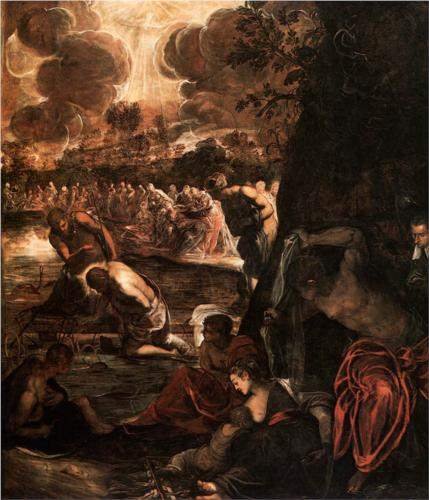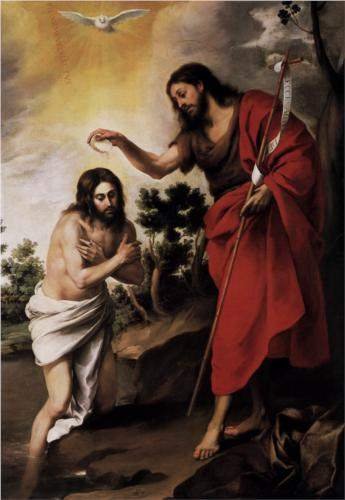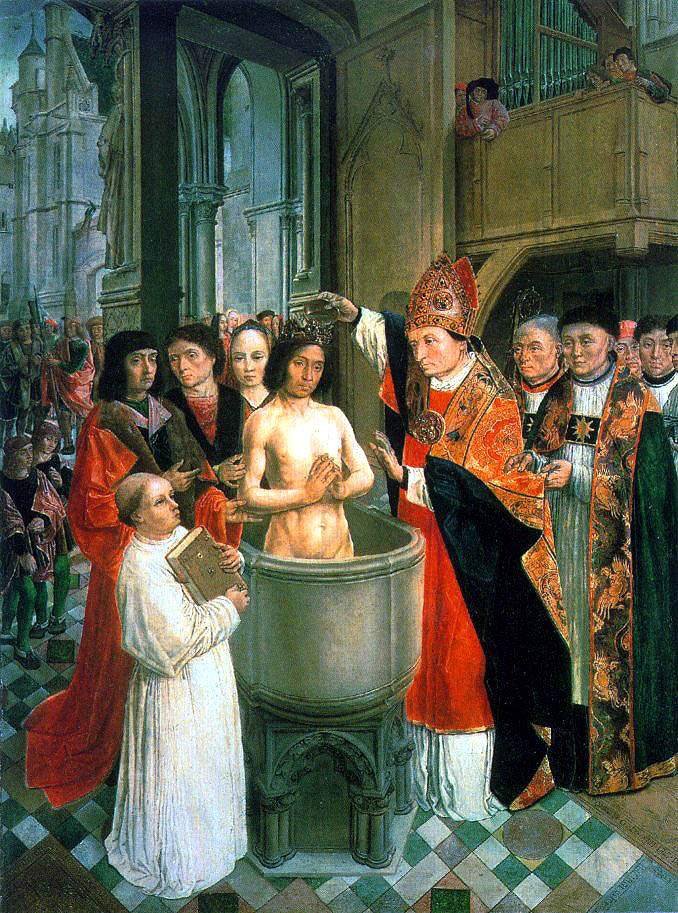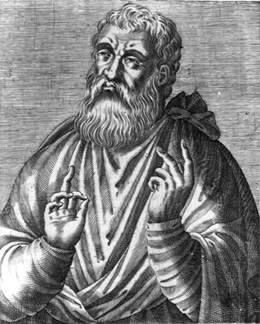
The Baptism of Christ (1581), by Tintoretto. (WikiPaintings.org)
In my RCIA class, Father Joe posed the question of which of the Sacraments is the most universal Christian sacrament. I guessed the Eucharist; just about everybody practices the Lord’s Supper, I figured. But no, the answer is Baptism, he said. My church growing up didn’t place much emphasis on Baptism, so I often tended to overlook it or underestimate its importance. But for the Catholic — for the historic Christian — Baptism is fundamental.
In Catholic theology, Baptism, Confirmation, and finally the Eucharist are called the Sacraments of Initiation. Through Baptism, the old life of the sinner is laid down and he is born anew in Christ. His sins are washed away; the very stain of original sin is erased. Baptism is the first and most important mark of initiation into the Christian community: The Christian initiate, or catechumen, is regenerated — becomes a new creation, washed clean and set apart — and he or she is prepared to share in the Body and Blood of Christ though the Eucharist. Since the earliest days of Christianity this has been the rite of passage into the Christian life. Even in Scripture, the absolute first thing that anyone did after coming to faith in Christ was to be baptized:
And Peter said to them, “Repent and be baptized every one of you in the name of Jesus Christ for the forgiveness of your sins, and you will receive the gift of the Holy Spirit. . . . So those who received his word were baptized, and there were added that day about three thousand souls. (Acts 2:38-41)
And the eunuch said to Philip, “About whom, I ask you, does the prophet say this, about himself or about someone else?” Then Philip opened his mouth, and beginning with this Scripture he told him the good news about Jesus. And as they were going along the road they came to some water, and the eunuch said, “See, here is water! What prevents me from being baptized?” And he commanded the chariot to stop, and they both went down into the water, Philip and the eunuch, and he baptized him. (Acts 8:34-38)
So Ananias departed and entered the house. And laying his hands on him he said, “Brother Saul, the Lord Jesus who appeared to you on the road by which you came has sent me so that you may regain your sight and be filled with the Holy Spirit.” And immediately something like scales fell from his eyes, and he regained his sight. Then he rose and was baptized. (Acts 9:17-18)

Baptism of Christ (c. 1665), by Bartolomé Esteban Murillo. (WikiPaintings.org)
Even for St. Paul himself, the first thing to do upon believing in Christ was to be baptized. Baptism was clearly very important to the Apostles and to the earliest Christians, such that becoming a Christian and being baptized were intimately and inseparably joined. Being baptized into Christ is the act of becoming a Christian. For as Paul wrote, “As many of you as were baptized into Christ have put on Christ” (Galatians 3:27).
So why was Baptism so crucial to the Apostles, from the very beginning, that they knew innately that it was the mark of becoming a Christian? Certainly, of all the Sacraments, it is the one most clearly taught by Christ:
“Go therefore and make disciples of all nations, baptizing them in the name of the Father and of the Son and of the Holy Spirit, teaching them to observe all that I have commanded you. And behold, I am with you always, to the end of the age” (Matthew 28:19-20).
“Go into all the world and proclaim the gospel to the whole creation. Whoever believes and is baptized will be saved, but whoever does not believe will be condemned” (Mark 16:15-16).
“Truly, truly, I say to you, unless one is born again he cannot see the kingdom of God.” Nicodemus said to him, “How can a man be born when he is old? Can he enter a second time into his mother’s womb and be born?” Jesus answered, “Truly, truly, I say to you, unless one is born of water and the Spirit, he cannot enter the kingdom of God.” (John 3:3-5)
Perhaps it is because it Jesus taught it so explicitly in Scripture that Baptism is so universally recognized by most Christians. But the Apostles evidently had a fuller understanding of what Baptism entailed — “the forgiveness of sins” — from the very first day of the Church. They understood its necessity and importance. This is one of the more obvious examples of Jesus clearly having taught the Apostles in greater detail during his earthly ministry than any of them ever wrote in Scripture. They passed this knowledge down to their own disciples — the beginning of Sacred Tradition.
Evangelicals have recently appropriated the term “born again,” but the Church from its very earliest days understood this new birth by water of which Jesus was speaking to be Baptism, and the Early Church practiced sacramental Baptism, the rite of initiation into Christ and into the Church, as St. Justin vividly attests:
I will also relate the manner in which we dedicated ourselves to God when we had been made new through Christ . . . They [catechumens] are brought by us where there is water, and are regenerated in the same manner in which we were ourselves regenerated. For, in the name of God, the Father and Lord of the universe, and of our Saviour Jesus Christ, and of the Holy Spirit, they then receive the washing with water. For Christ also said, “Unless you be born again, you shall not enter into the kingdom of heaven” (John 3:5).
—St. Justin Martyr
First Apology 61 (ca. A.D. 150)
In this sense, every Catholic is a “born again” Christian.
I am sure I am preaching to the choir about the importance and sacramentality of Baptism. But I know in many Protestant communities, such as the one I grew up in, Baptism was relegated to a side show, a mere “public profession of faith” that was performed maybe one Sunday night out of the month, if that often. For so many Protestants, the efficacious Sacraments taught by Christ and the Apostles have become mere symbolic gestures, devoid of any real power and therefore of any real necessity. And some of them dare accuse Catholics of practicing “empty ritual”! This is running a bit long — but now that I’ve provided a scriptural foundation for the Sacrament of Baptism, I can move on next time to what I really wanted to talk about: Why have Protestants downplayed or even rejected the Sacraments? How can Protestant Christians be saved in these communities? No, I am not going to go off on a polemic again. I may be critical, but I intend to share a message a hope and mercy and love.


